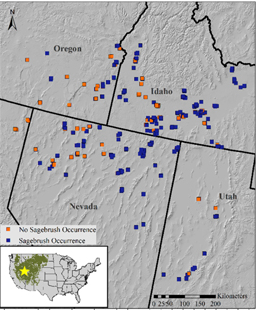O’Connor, R.C., Germino, M.J., Barnard, D.M., Andrews, C.M., Bradford, J.B., Pilliod, D.S., Arkle, R.S., Shriver, R.K., 2020, Small-scale water deficits after wildfires create long-lasting ecological impacts: Environmental Research Letters, https://doi.org/10.1088/1748-9326/ab79e4
Moisture deficit affects ecological processes and land management interventions, such as restoration of native vegetation. However, there is little guidance on how to determine when water deficit becomes ecologically impactful and thus constitutes ecological drought.
Federal and university researchers modeled the influence of drought on big sagebrush restoration outcomes on over 600 plots in previously burned areas in the Great Basin. Water deficit was characterized by a widely used drought index called the standardized precipitation-evapotranspiration index (SPEI), and the number of days with wet and warm conditions in the top 5 cm of soil – a thin layer where seeds and young seedling roots occur. SPEI was not predictive of whether sagebrush had reestablished, yet wet-warm days elicited a critical drought threshold response. During the first March following summer wildfire and restoration, successfully reestablished sites experienced seven more wet-warm days than unsuccessful sites, many of which remained shrubless two decades later. These findings help clarify the definition of ecological drought for a foundational species and show that drought after fire can have long-lasting impacts on ecosystems.
Contact: Matthew Germino, FRESC, 208-426-3353, mgermino@usgs.gov

